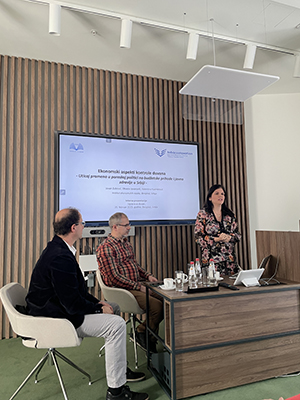
Workshop: Impacts of Tobacco Tax Increases on Tax Revenues and Public Health in Serbia
Venue: Tobacco Administration, Belgrade
Date: 20.02.2024.
On Wednesday, February 20, 2024, the Institute of Economic Sciences (IES) organized a presentation of the latest research results to the Tobacco Administration obtained during the previous year. The meeting was opened by an introduction on the research progress of the IES team in the realization of the project "Accelerating Progress on Effective Tobacco Tax Policies in Low and Middle-Income Countries". The IES director and Tobacco Taxation project PI, Jovan Zubović, provided the opening speech.
During the meeting, Olivera Jovanović, a project researcher, presented the results of the Impacts of Tobacco Tax Increases on Tax Revenues and Public Health in Serbia. The results showed that by increasing the specific excise tax in Serbia by 15 percent per year, the revenues generated from tobacco excise taxes will be higher in the forecast years. In the first estimated year, budget revenues from tobacco excise taxes will be higher by 7 percent, while in the second estimated year will be higher by 6.9 percent. The benefits for public health will be positive since the number of premature deaths will be reduced.
Some of the key recommendations for policymakers include:
- The government should consider an increase in specific excise by at least 15 percent, because the economic effects will be positive. Higher specific excise will increase the overall tobacco excise revenues as well as total budget revenues.
- The government should consider improving tobacco tax policy beyond the economic impact, as the public health benefits are also very significant. The impact on smoking cessation (more) and youth smoking initiation (less) will save people from premature deaths and improve the quality of life in Serbia, as people will be healthier and more economically productive.
The results of research on the macroeconomic impact of tobacco taxation on poverty and inequality in Serbia were presented by a project researcher, Aleksandar Zdravković. The research results show that although the cost of cigarettes is regressively distributed (the share of cigarette costs is higher among the lower-income population compared to the higher-income population), the additional taxation of cigarettes has a progressive effect (the disproportion decreases in favor of lower-income households), regardless of the level of the tax rate change. Additional taxation of tobacco products increases the risk of an increase in poverty, but the estimated increase in the relative poverty rate is small and lies between 0.5 (25 percent increase in specific excise tax) and 1 (50 percent increase) percentage point for the scenarios examined, and can be significantly reduced or completely neutralized by a revenue-neutral tax reform in which the additional revenue is used to subsidize other products and services.
The presentations were followed by a fruitful discussion which highlighted the need for further collaboration between science and policymakers in creating effective tobacco taxation and tobacco control policies in Serbia. Tobacco Administration representatives emphasized the importance of future research on the use of heated tobacco products.





